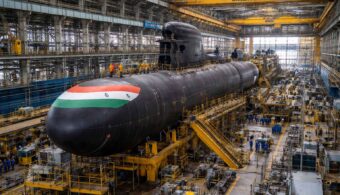Germany has unveiled a €6 billion ($7 billion) funding programme to help its heavy industries curb carbon emissions — marking the first time carbon capture and storage (CCS) technology has been formally integrated into national climate contracts.
Announced by Federal Minister for Economic Affairs and Energy Katherina Reiche on Monday, 6 October, the initiative represents a key step in Germany’s broader strategy to achieve net-zero emissions while safeguarding its industrial competitiveness.
Targeting Hard-to-Abate Sectors
The funding is directed toward energy-intensive sectors such as steel, cement, chemicals, and glass, which account for a significant share of industrial emissions. These industries will be offered 15-year climate protection contracts, reimbursing them for the additional costs of adopting cleaner technologies, including CCS and hydrogen-based processes.
Under the scheme, companies have until December 1, 2025, to submit project proposals. The first reverse auction is slated for mid-2026, contingent upon approval by the German Bundestag and the European Commission.
New Phase of Climate Contracts
The latest round expands on last year’s pilot phase, which allocated €2.8 billion to 15 projects in October 2024. That earlier initiative excluded CCS technologies, which are now being brought into the fold to capture and store CO₂ emissions underground — a controversial but increasingly recognised tool for industrial decarbonisation.
Minister Reiche said the government’s aim is to “support transformation without undermining competitiveness,” signalling a more flexible approach to Germany’s energy transition.
Projects will be selected through competitive bidding, prioritising those that deliver the greatest emissions cuts at the lowest cost to the public purse. Successful bidders will also be required to meet binding emissions-reduction milestones.
Industrial Support and Economic Context
Industry associations have welcomed the inclusion of CCS, describing it as a pragmatic move to reconcile climate ambition with economic realities. “This approach recognises that not all sectors can electrify at the same pace,” a federation spokesperson noted, urging stability in long-term energy policy.
Germany’s industrial backbone has been under pressure due to high energy costs and global trade tensions. The chemical sector, for instance, operated at just 72% capacity in Q2 2025, its lowest in over three decades — underscoring the urgency of fiscal support to maintain competitiveness.
Funding Path and Political Approval
The €6 billion package — earmarked for the 2026 budget year — replaces months of uncertainty after fiscal disagreements stalled previous funding plans. The original idea of a €23 billion fund was shelved following a budget impasse last year. The government of Chancellor Friedrich Merz initially proposed a smaller €1.8 billion allocation but eventually endorsed the larger programme to meet EU climate commitments.
The scheme still awaits parliamentary and EU state aid clearance, with consultations open until December 1, 2025. Once approved, it is expected to trigger a new wave of industrial climate investments starting mid-2026.
Balancing Climate Goals and Industrial Competitiveness
By embedding CCS into national climate contracts, Germany is signalling a policy shift towards technological neutrality, supporting both innovation and emission reduction. The initiative seeks to maintain the nation’s industrial edge while advancing toward its 2045 carbon-neutrality target.
Experts view the move as a template for Europe’s industrial transition, blending fiscal prudence with clean-tech acceleration — a balance that could determine the future of Europe’s manufacturing competitiveness in a low-carbon world.



